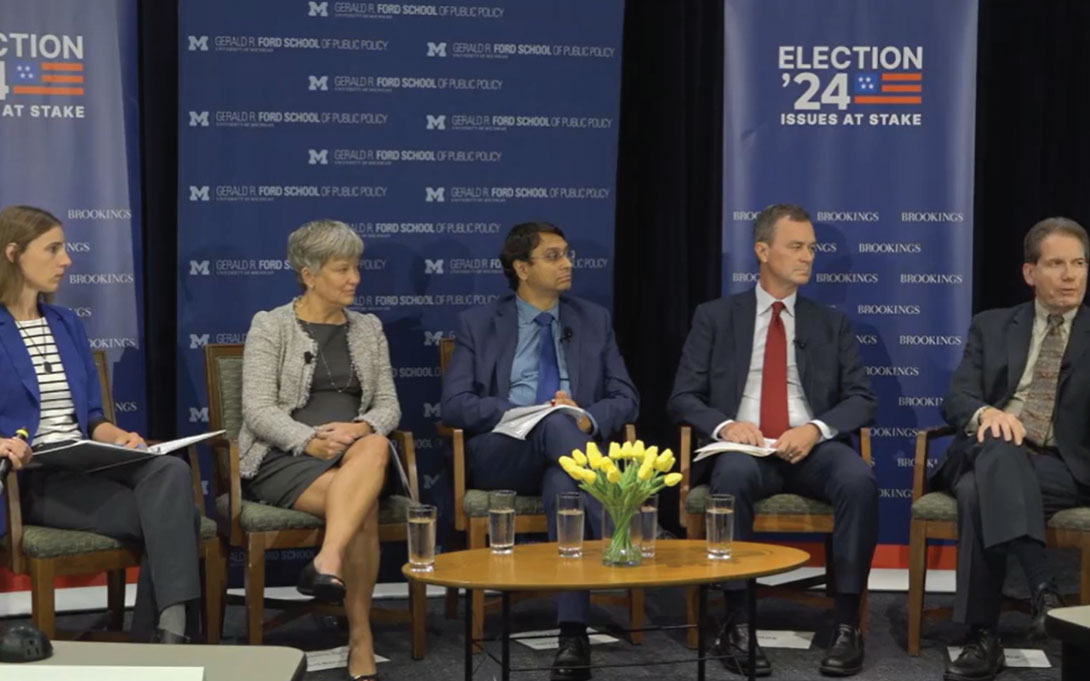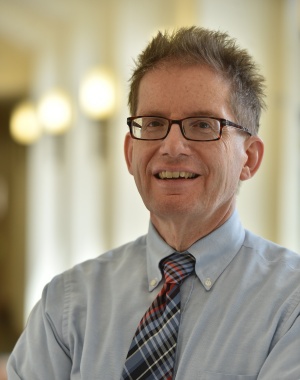
Climate change is projected to cause 250,000 deaths per year from 2030 to 2050; its effects have already cost 3 trillion dollars and resulted in 100 million people falling into poverty worldwide. The Brookings Institution partnered with the Ford School of Public Policy in a Policy Talk to help frame the stakes of the 2024 election in terms of the future of U.S. climate policy, which will shape the ability to address these formidable threats.
Ford School professor Barry Rabe laid out the unique challenges of effective action on climate, citing resistance to major structural changes, the necessity of global cooperation, and the difficulty of thinking about consequences far into the future. Rabe also emphasized the influence of widespread climate change denialism as a particularly thorny obstacle in the U.S. context: “It’s tough politics…when you live in a national context where substantial portions of the citizenry - the electorate - have doubts that the problem really exists or that it's credible, or that different policies might work.”
Despite these significant barriers, the Biden administration made historic investments in America’s clean energy transition through the Inflation Reduction Act (IRA). Brookings scholars Brahima Coulibaly, Samantha Gross, and Sanjay Patnaik discussed some of the law’s principle accomplishments and its biggest barriers to implementation. The IRA provides incentives for renewable energy projects, tax credits, and rebates for private investment and consumer home improvements. Patnaik thinks these “carrots” are ultimately less optimal than a “stick” like Europe’s carbon pricing system. Nonetheless, he also commended the Act’s use of fundamental economic principles: “You're not going to get people to do the right thing just by asking them…you're going to get people to do the right thing by having the right price signals, the right market signals, and the potential right incentives.”
Coulibaly said major structural changes are needed to reduce the dependence on fossil fuels, which “run through the veins of the entire global economy and society.” So even though the IRA has passed, state and local governments which are receiving the funds, as well as the next presidential administration, will have broad leeway to oversee its implementation.
That implementation faces both practical and political challenges. To create a new green energy system, Gross pointed out, “you’re going to have to put a lot of concrete and steel in the ground, and you’re going to have to build things.” Slow permitting processes, restrictive zoning laws, and community resistance all have the potential to hinder this construction.
Michigan Department of Environment, Great Lakes, and Energy (EGLE) director Phillip Roos affirmed that state legislation regarding renewable project siting authority, utility regulations, and environmental justice considerations will play a huge part in determining how Michigan spends its $26 billion from the IRA.
Despite the fact that the two major candidates have “diametrically opposed views on what we should do about our energy system and about climate,” Gross believes that the major provisions of the IRA are “likely to stick around” due to significant investments in Republican-leaning districts that form the American industrial base. Nonetheless, a more hostile administration could still deregulate, slow, or stall implementation, not to mention reduce the United States’ climate leadership on the world’s stage.
Tonya Allen, president of the McKnight Foundation, concluded the event with a conversation about how to recenter human perspectives in our narratives about climate change. She emphasized that equity and environmental justice considerations will be crucial to ensuring that the energy transition does not further disenfranchise the communities already bearing the brunt of the climate crisis. “For a really long time, the climate movement talked about the planet and never about people,” she said. But in reality, the truth is that “if you don't take care of the earth, it'll still be around…we just won't.”
You can see the Policy Talk here.
